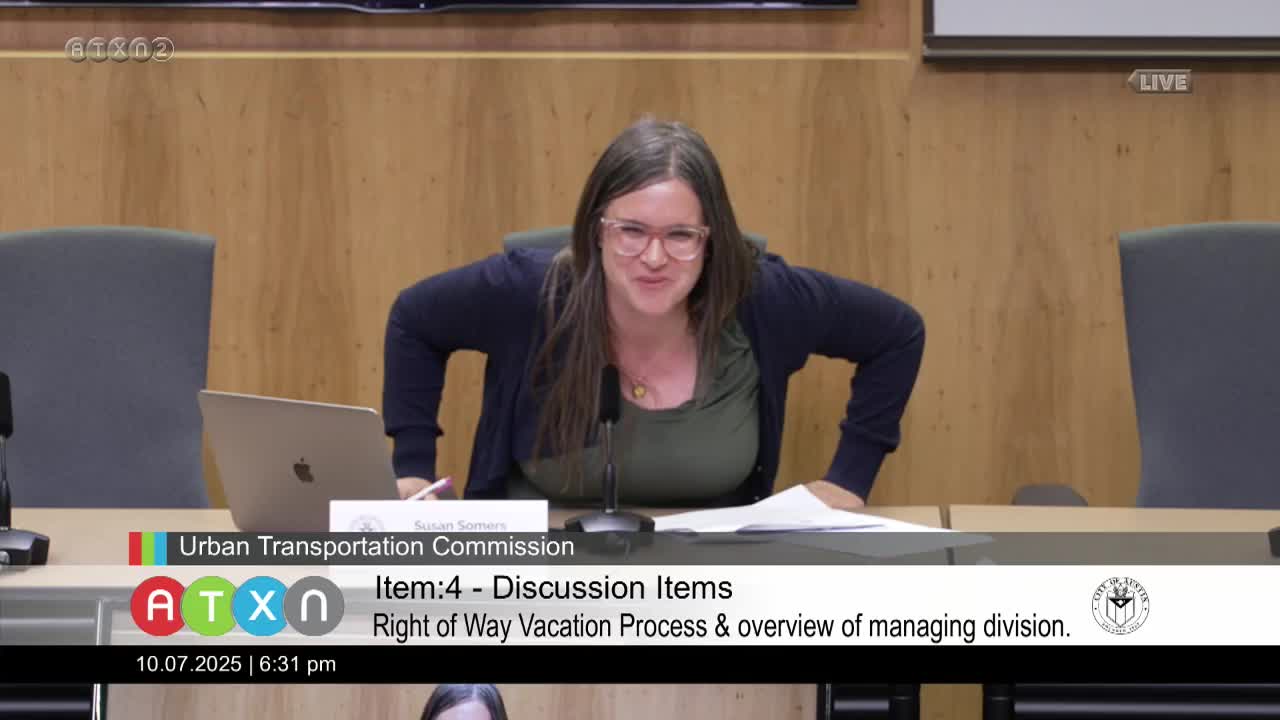TPW outlines Austin right‑of‑way vacation process, fees and typical timetable
October 07, 2025 | Austin, Travis County, Texas
This article was created by AI summarizing key points discussed. AI makes mistakes, so for full details and context, please refer to the video of the full meeting. Please report any errors so we can fix them. Report an error »

A city official gave a step‑by‑step overview of how property owners request formal vacation of public right of way, describing fees, interdepartmental review, appraisal and recording procedures.
Joseph Fortinos, project manager of the Land Management Group in Austin Transportation & Public Works, told commissioners that a right‑of‑way vacation is a request to relinquish the public’s interest in platted right of way back to abutting property owners. "The right of way is dedicated to the city via plat or separate instrument," Fortinos said.
Fortinos walked the commission through the key steps: an initial consultation with TPW land management to check feasibility; submission of a comprehensive application and a nonrefundable city application fee (reported at $14,413); an internal and external review process that can involve many reviewers — Austin Water, Austin Energy, Austin Fire, cable and fiber providers — and public notification to property owners within 300 feet. If reviewers conditionally approve, the Office of Real Estate engages a third‑party appraiser to determine the fair market value of the city’s interest; the applicant pays the appraisal and — if the council approves the vacation ordinance — the fair market value is paid to the city and the deed without warranty is recorded to transfer the land back to the abutting owner.
Fortinos said the overall process often takes up to 12 months and can be longer if issues arise. He told commissioners the Office of Real Estate handles appraisals and that applicants can choose a 30‑ or 60‑day appraisal. If City Council rejects a vacation after an applicant has paid the appraisal, Fortinos said the applicant will receive a refund for the appraisal fee.
The presentation noted that applicants sometimes file vacations without an accompanying site plan; Fortinos said owners may seek to clear title or simplify parcels before deciding a long‑term development plan. Public notifications generate any objections, which are recorded and included in staff reports and in the request for council action.
Fortinos encouraged applicants to use the initial consultation to avoid wasted expense and said land‑management staff will present vacations to boards and commissions, including UTC, to advise council. "This goes out to both internal and external reviewers and they come back with either an approved, approved with conditions, or an outright rejection," Fortinos said.
Commissioners asked for staff materials to be made available to new commissioners and for a dataset of past vacation requests; staff said they would follow up with email resources and could provide data on request.
Joseph Fortinos, project manager of the Land Management Group in Austin Transportation & Public Works, told commissioners that a right‑of‑way vacation is a request to relinquish the public’s interest in platted right of way back to abutting property owners. "The right of way is dedicated to the city via plat or separate instrument," Fortinos said.
Fortinos walked the commission through the key steps: an initial consultation with TPW land management to check feasibility; submission of a comprehensive application and a nonrefundable city application fee (reported at $14,413); an internal and external review process that can involve many reviewers — Austin Water, Austin Energy, Austin Fire, cable and fiber providers — and public notification to property owners within 300 feet. If reviewers conditionally approve, the Office of Real Estate engages a third‑party appraiser to determine the fair market value of the city’s interest; the applicant pays the appraisal and — if the council approves the vacation ordinance — the fair market value is paid to the city and the deed without warranty is recorded to transfer the land back to the abutting owner.
Fortinos said the overall process often takes up to 12 months and can be longer if issues arise. He told commissioners the Office of Real Estate handles appraisals and that applicants can choose a 30‑ or 60‑day appraisal. If City Council rejects a vacation after an applicant has paid the appraisal, Fortinos said the applicant will receive a refund for the appraisal fee.
The presentation noted that applicants sometimes file vacations without an accompanying site plan; Fortinos said owners may seek to clear title or simplify parcels before deciding a long‑term development plan. Public notifications generate any objections, which are recorded and included in staff reports and in the request for council action.
Fortinos encouraged applicants to use the initial consultation to avoid wasted expense and said land‑management staff will present vacations to boards and commissions, including UTC, to advise council. "This goes out to both internal and external reviewers and they come back with either an approved, approved with conditions, or an outright rejection," Fortinos said.
Commissioners asked for staff materials to be made available to new commissioners and for a dataset of past vacation requests; staff said they would follow up with email resources and could provide data on request.
View full meeting
This article is based on a recent meeting—watch the full video and explore the complete transcript for deeper insights into the discussion.
View full meeting
